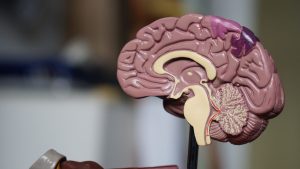What is Wet Brain? About Wernicke-Korsakoff Syndrome
Excessive alcohol use can impact your health in many ways, ranging from short-term illness to chronic disease. One of the lesser-known dangers of alcohol abuse and alcoholism is Wernicke-Korsakoff syndrome, sometimes referred to as “wet brain.”
This article will discuss what causes wet brain, how it is treated, and steps you can take to help prevent this devastating illness.
Impacts of Wet Brain

Wernicke-Korsakoff syndrome is a serious and debilitating brain disease, affecting about one to three percent of the population. These rates are higher if you suffer from an alcohol use disorder, reaching closer to 12 percent. It appears to be more common in men than women.
Wet brain causes severe movement disorders and cognitive impairment that can disrupt many areas of your life—creating challenges with work, relationships, and even simple daily activities like dressing and hygiene. In severe cases, a person may require long-term care in a medical facility.
Wet Brain Symptoms
Although the name might suggest Wernicke-Korsakoff syndrome is a single condition, it generally occurs in two different phases, each with their own constellation of symptoms.
Wernicke’s encephalopathy is an acute neurological disease with three characteristic symptoms:
- Mental confusion
- Ataxia (poor coordination)
- Nystagmus (involuntary eye movements).
Other symptoms, such as neuropathies, low blood pressure, delirium, and coma may occur as well.
Wernicke’s syndrome can be life-threatening; the mortality rate is around 20 percent without prompt medical care. Symptoms may be reversible with early treatment, but diagnosis is often difficult. There is no specific test for this syndrome, and many times it isn’t discovered until an autopsy is done.
Korsakoff syndrome is a chronic condition that usually develops after an episode of Wernicke’s encephalopathy. In fact, left untreated, an alarming 85 percent of Wernicke’s survivors develop Korsakoff’s syndrome. Recovery is unlikely at this point, and many people with this condition will need round-the-clock care in an institutional setting.
Severe memory problems are a signature symptom of Korsakoff syndrome. People with this condition often struggle to form new memories, or experience long-term “gaps” in their recollection due to brain damage. Many create false memories, called confabulations, to make up for the real memories they have lost.
What Causes Wet Brain?
Wet brain occurs when your body does not have enough thiamine, or vitamin B1. Your body cannot produce this nutrient on its own—it can only come from dietary sources such as thiamine-rich foods and vitamins.
Thiamine is critical for keeping cells in your body healthy by supporting energy metabolism. Your brain uses up a lot of energy, and without enough thiamine around cells become damaged and die. Three parts of the brain important for memory formation and storage—the thalamus, hypothalamus, and mammillary bodies—can eventually shrink in size if you don’t consume enough of this nutrient.
Alcohol addiction is a common cause of thiamine deficiency. Heavy drinking not only decreases absorption of thiamine, but can also lead to a poor diet, increasing the chances you’ll develop wet brain.
Treatment For Wernicke-Korsakoff Syndrome

Wernicke’s syndrome is a medical emergency. A person will need high-dose thiamine injections to help overcome and reverse symptoms, and will sometimes need to be hospitalized.
Once the most severe symptoms are under control, patients can switch to thiamine tablets. Other supplements such as magnesium, phosphate, and potassium can also support recovery. Drinking alcohol should be avoided completely to prevent further episodes.
Once a person has progressed to Korsakoff syndrome, there is little to be done other than manage the condition. For this reason, it’s important to treat wet brain as early and as aggressively as possible to prevent permanent damage.
Prevention
There are several steps you can take to avoid Wernicke-Korsakoff syndrome, and prevent nutrition deficiencies caused by alcohol:
- Cut back on the amount of alcohol you consume
- Eat more thiamine-rich foods, such as whole grains, poultry, beef, and legumes
- Supplement with vitamins
If you’re concerned that your alcohol consumption is affecting your health, programs like Ria Health can help you cut back or quit more easily. Our evidence-based, 100 percent online program gives you access to expert medical care, anti-craving medications, recovery coaching, and more. All without having to leave home or disrupt your schedule.
Learn more about how it works, or schedule a call with a team member today.
Will insurance cover treatment? Verify Coverage
Have Questions? Call (800) 504-5360



